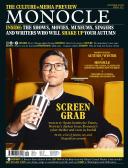
Issue 117
The culture and media preview. Inside: the shows, movies, museums, singers and writers who will shake up your autumn.
In This Issue
Oops! No content was found.
Looks like we no longer have content for the page you're on. Perhaps try a search?
Return Home

